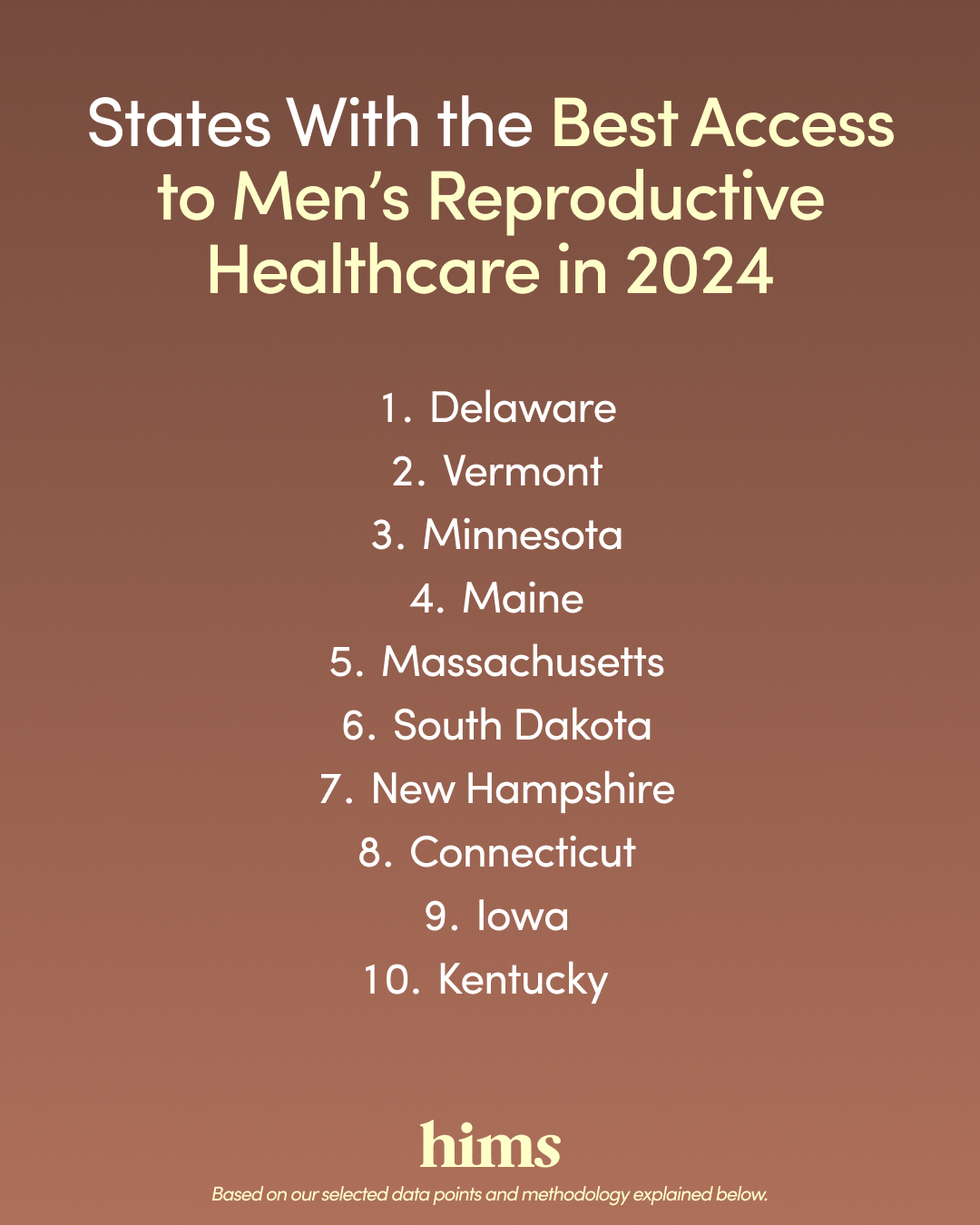Delaware tops the 2024 list of states with the best access to men's reproductive healthcare

Tualek Photography // Shutterstock
Delaware tops the 2024 list of states with the best access to men’s reproductive healthcare
Male patient holding his crotch consults with a doctor.
Men’s reproductive health care issues don’t always capture the same amount of attention as women’s sexual and reproductive health concerns. However, testing, screening, and treating sexual issues can improve both the quality of life for men and their long-term health outcomes.
Hims set out to find the states with the most access to reproductive health resources for men using the following three sets of data:
- Urologists per 100K residents: While urologists frequently see male patients for sexual function issues, they’re also well-positioned for early detection of all kinds of medical conditions.
- Percentage of uninsured men: Data reveals that health insurance has a direct impact on the use of services and health outcomes for adults, including screening services and treating sexually transmitted diseases.
- State public health clinics per 100K residents: Public health centers balance improved outcomes with lower costs for patients, making them a valuable resource for communities across the country.
![]()

Hims
Key Findings
List of states with best men’s reproductive healthcare
- New England and Mid-Atlantic states had the most access. Delaware, Vermont, Maine, Massachusetts, New Hampshire, and Connecticut all take spots in the top 10 states.
- The Midwest has mixed results. Minnesota, South Dakota, and Iowa rank near the top of the list, while Montana, Illinois, and Nebraska fall in the bottom half of the overall list.
10 States With the Best Access to Men’s Reproductive Health care
- Delaware
- Vermont
- Minnesota
- Maine
- Massachusetts
- South Dakota
- New Hampshire
- Connecticut
- Iowa
- Kentucky
States for Men’s Reproductive Health care Access: Trends and Insights
Hims broke down the three access categories, taking a deeper look at the ratio of urologists, the number of men without health insurance, and access to state public health clinics.
Which States Have the Highest Ratio of Urologists?
Many communities in the U.S. face access issues for urologists, which has the potential to negatively impact men’s sexual and overall health outcomes. Hims looked at each state’s number of urologists compared to the population to find the highest ratio.
States With the Highest Ratio of Urologists
- New York
- Massachusetts
- New Hampshire
Which States Have the Lowest Percentage of Uninsured Men?
Research shows that people without insurance are less likely to seek out preventive care (like STI/STD and cancer screenings) and care for existing health conditions.
States with the lowest percentage of uninsured men
- Massachusetts
- Hawaii
- Iowa
Which States Have the Most Public Health Clinics per 100K Residents?
Public health clinics increase access to health services and screenings, but density varies greatly by location. Some rural states invest more in providing access to residents, as seen in the top three states in this category.
States with the most public health clinics per 100K
- South Dakota
- Maine
- Wyoming
State’s Access to Men’s Reproductive Health Care: Full Ranking
Based on the three data categories outlined above, here are all 50 states ranked from most to least access when it comes to providing reproductive health care access for men.
1. Delaware
2. Vermont
3. Minnesota
4. Maine
5. Massachusetts
6. South Dakota
7. New Hampshire
8. Connecticut
9. Iowa
10. Kentucky
11. Michigan, Ohio, Pennsylvania, Wisconsin (tied)
15. Maryland
16. New York
17. Louisiana and Rhode Island (tied)
19. Washington
20. New Jersey
21. Hawaii and Virginia (tied)
23. Oregon and Wyoming (tied)
25. Missouri
26. Colorado
27. Kansas and North Dakota (tied)
29. Indiana and Tennessee (tied)
31. Nebraska
32. Arkansas
33. Illinois
34. Utah
35. New Mexico
36. Idaho and West Virginia (tied)
38. Alaska
39. South Carolina
40. Alabama
41. California, Florida, Mississippi, Montana (tied)
45. North Carolina
46. Arizona
47. Oklahoma
48. Georgia
49. Texas
50. Nevada
Note: Based on data collected in September 2024. Get the data.
Data and Methodology
Hims based these rankings on three data categories related to services and access for men’s sexual health.
- Urologists per 100K residents: Based on the ratio of urologists per 100,000 residents in each state, using data from the American Urological Association.
- Percentage of uninsured men: Using data from KFF—Health Insurance Coverage of Men 19-64, (2022)—we ranked the percentage of uninsured adult men in each state.
- State public health clinics per 100K residents: Hims calculated the number of state-run public health clinics. Some states partially outsource these clinics to nonprofit organizations, but Hims only counted those directly operated by state public health departments, not counting clinics that only cater to women or children.
3 Tips to Access Men’s Health Care
Accessing health care is crucial for men’s well-being at all ages. Here are three ways to get better access to services even if you live in an area that has fewer options for different types of health care needs.
- Shop around for affordable options: Medical care can be expensive, so it’s important to do your research. If you’re in need of specialized care, a referral from your primary care physician is a great place to start. To help keep overall health care costs as low as possible, consider exploring income-based health insurance coverage. State and nonprofit health clinics offer free or low-cost screening services. They often hold traveling clinics and pop-up clinics at public facilities, like libraries. You can also order at-home test kits for a range of sexually transmitted infections and diseases, as well as urinary tract infections.
- Explore digital options for sexual health care: The growing telehealth industry has made huge strides in improving access for all types of care. Often, telehealth companies offer affordable care without requiring health insurance. You can receive treatment online through certified medical professionals for things like erectile dysfunction, premature ejaculation, weight loss, mental health, hair loss, dermatology, and more.
- Reduce stress levels: Chronic stress can impact health, leading to anxiety, PTSD-like behavior, metabolic dysfunction, and inflammation. Learn how to manage your stress by eating well, exercising, getting enough sleep, and taking time off work when needed if you’re able to.
Prioritize Your Health Care
No matter what kind of health care help you need, it’s better to get started sooner instead of delaying your care.
This story was produced by Hims and reviewed and distributed by Stacker Media.
